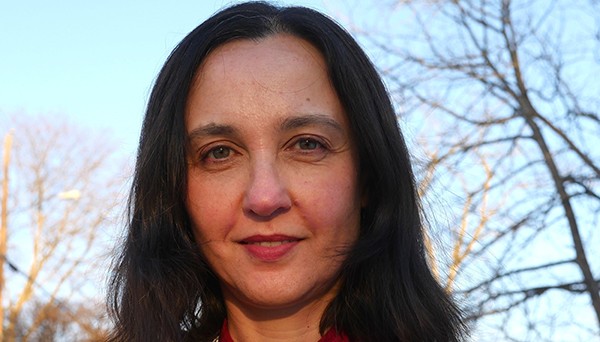News directly from Cornell's colleges and centers
The Johnson Museum of Art welcomes educator and curator Gemma Rodrigues
By Andrea Potochniak
The Johnson Museum of Art welcomes Gemma Rodrigues as the Ames Director of Education and Curator of the Global Arts of Africa.
“I’m elated to be joining an institution as respected as the Johnson, as an educator and as a curator,” she said. “Cornell University’s land-grant mandate to combine research and teaching with public service has long intrigued and impressed me, and I am especially excited to support the Museum in fulfilling this hybrid mission amid current movements for social justice and redress.”
Rodrigues will direct the education program at the Johnson to support critical inquiry and appreciation of global arts and cultures for Cornell classes working with the Museum, K-12 teachers and schools, community groups, and members of the public. She is also charged with cultivating new collaborative relationships for the Museum within Cornell, with regional civic and cultural organizations, and with museums nationally and globally. In the coming years Rodrigues will also design a museum training program that draws on the strengths of the Johnson’s current internship program, creating an inspired cohort of students ranging from freshmen interns to postdoctoral fellows.
Rodrigues has been an educator, curator, and researcher at the intersections between the academy, the arts, and the public for more than two decades. Her work as an educator has encompassed diverse settings, from teaching French language and literature to high school students and African and Western art history to graphic design and fine-art diploma students in Zimbabwe, to teaching undergraduate seminars on architecture, urbanism, and colonialism at Harvard University.
She served as Curator of African Arts at the Fowler Museum at UCLA between 2010 and 2015 and has organized more than fifteen exhibitions on three different continents. Curatorial highlights include a major solo exhibition for the Belgian Cameroonian artist Pascale Marthine Tayou in Los Angeles in 2015 and a cross-disciplinary exhibition exploring the intersections of art, design and technology in Africa at the Casa da Luz, Portugal, in 2017, which brought together scholars and creators from over seventeen countries in Africa, Europe, and North America. At UCLA, she brought artists such as Simone Leigh and Akosua Adoma Owusu to campus to engage with the Fowler’s African art collections and exhibit new work.
Most recently Rodrigues worked as a researcher of emerging technology and design in African contexts with the Critical Technical Practice Lab in Madeira, Portugal.
She has published a wide range of scholarly chapters, reports, and conference papers, including “African art and art history's global turn,” in Global and World Art in the Practice of the University Museum (Routledge, 2017); World Share: Installations by Pascale Marthine Tayou (Fowler Museum at UCLA/University of Washington Press, 2016), “The Art of Music in Africa,” The Art of Music (San Diego Museum of Art/Yale University Press, 2016), and a white paper commissioned by the UK–based Comic Relief Trust, Social Tech Ecosystems in Sub-Saharan Africa (2018). She also served as co-editor of the journal African Arts (MIT Press) from 2010–15. Rodrigues has given invited lectures exploring her research and museum practice at UC Santa Barbara, Dumbarton Oaks, the San Diego Museum of Art, and Claremont Graduate University, among others; has served as a contemporary art consultant for Creative Capital, and was invited to participate in a Mellon Foundation art writer’s residency at Rhodes University, South Africa.
Of South Asian and European descent, Rodrigues was born and raised in Harare, Zimbabwe and has lived and worked in the US, UK, Portugal, and Zimbabwe. She studied art history at UC Berkeley, St. Andrews University in Scotland, and Harvard University, where her doctoral research explored relationships between Zimbabwe’s land reform program of the 2000s and concepts and ideologies of land in contemporary art, architecture, and urban masquerade ceremonies.
“Strengthening the Johnson’s role as a gateway for the public to Cornell’s cross-disciplinary visual arts research environment will be among my key priorities. The same will be true for its converse—strengthening the role of the Museum as a cultural and educational gateway to the public for Cornell’s students, researchers, and faculty,” she said. As part of her curatorial responsibilities, she looks forward to developing the Museum’s collections of contemporary and historical African art and supporting their study and dissemination through partnerships with diverse communities in Africa and Africa’s diasporas, as well as with students and scholars at Cornell and beyond.
Media Contact
Get Cornell news delivered right to your inbox.
Subscribe

